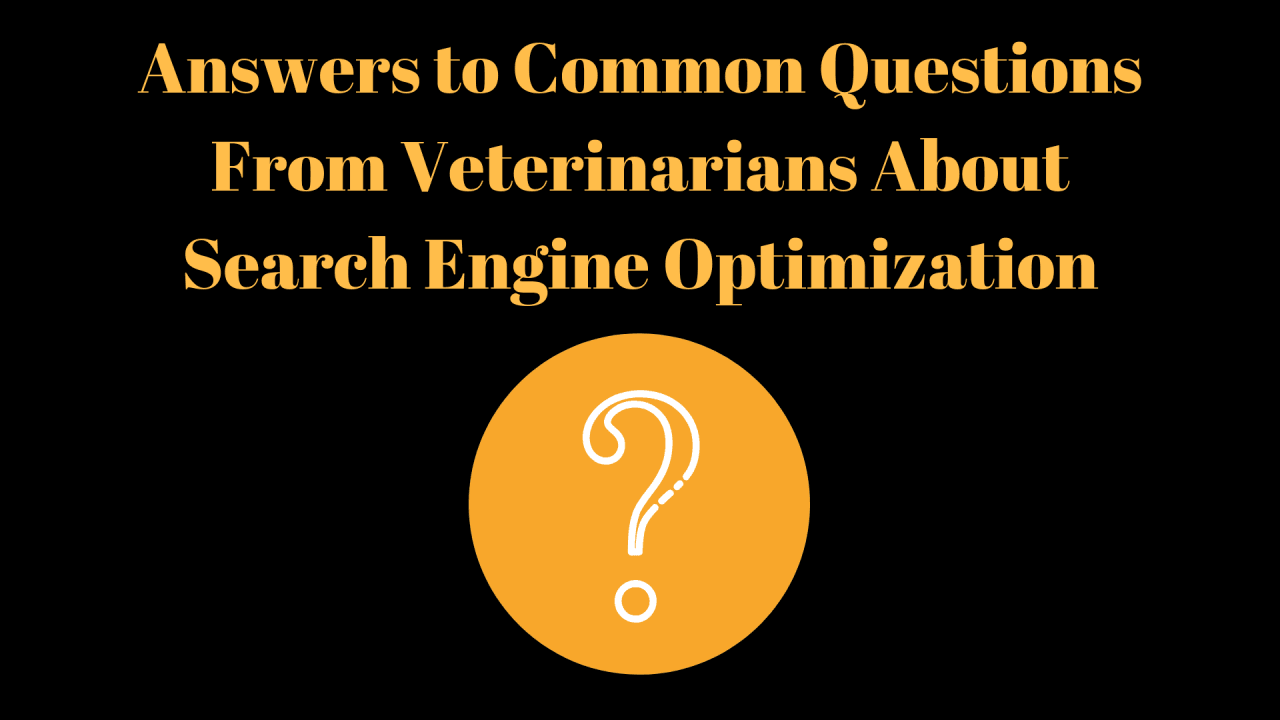Answers to Common Questions From Veterinarians About Search Engine Optimization
After working with so many veterinarians to improve their visibility in online searches, we’ve realized that they often have quite a few questions about what it is that we do. There’s quite a bit of overlap in what they all want to know, so we figured that we’d have our veterinary search engine optimization pros tackle them all in one place. Let’s dig in!
What Is SEO?
We’ve gone into the basics of search engine optimization (SEO) in another one of our posts, but let’s go over the basics quickly. You have a brand new pet owner who lives two miles from your practice. They’ve just adopted their first dog, and they’ve never had a veterinarian before. It’s the year 2019, so clearly the first thing they do is open up a Google search page and type in “veterinarian near me.” When they hit enter, what do they see? There’s a list of results that some smart people at Google think matches their search the best. To make it onto that search page, you’re often going to need to prove to Google that you’re exactly what that pet owner is looking for. After all, if Google had bad results on the first page then no one would use them. Search engine optimization is a fancy way of saying that you’re making your practice look pretty to Google’s algorithms. More specifically, veterinary SEO makes your practice look prettier than your competitors.
Where Does the Magic Happen?
There’s often a disconnect between understanding the benefits of search engine optimization for veterinary practices and knowing how it actually happens. Take a look at any website (your own included). There are parts of the page that you can see -- like the words, images and videos -- and other aspects that you can’t -- like meta tags and schemas and links. SEO encompasses both of these web page aspects. Google and other search engines will ‘crawl’ a website, ferreting out as much information as possible. Poorly made pages will have sparse, inaccurate or misleading information, while well-made ones are going to present themselves cleanly and accurately. The goal isn’t to game the system in order to cheat, it’s to put your best foot forward in the most effective way.
What’s Important For Veterinary SEO?
Without going into the technical aspects of this, it’s an easy question to answer. Veterinarians are local businesses offering a discrete set of services. In other words, there are just a handful of (highly competitive) search terms that you want to come up for. “Veterinarian in Miami,” “spay and neuter Seattle” and “emergency vet Phoenix” are great examples. These are the searches of people who need exactly what your practice provides, and they’re often close to making a decision on who they want to care for their pets. They’re local, and they’re specific to what your business provides. Proper SEO makes sure that your website shows up in their searches.
What Are Common SEO Mistakes?
This one is tough, if only because once we get into common mistakes people realize they’ve been paying for some really low-quality solutions for years. The biggest one that we see? Duplicate content. Having a website that uses stock wording on each page is a great way to get search engines like Google to give you the cold shoulder. When you think about it logically, the algorithms are just trying to provide good, unique search results for users. They don’t want people to click on every link on the first page of results only to read the same content over and over again. Their way to combat this is to automatically ding websites that exist in multiple formats across the internet. They’re also going to avoid spam websites, which are often identified by looking for keyword stuffing. It’s a Goldilocks problem -- not too much and not too little SEO, you have to hit the mark just right.
Can I ‘Set It & Forget It?’
Short answer on this one? No. Search engines like Google have a vested interest in constantly updating their algorithms. If they didn’t spam and low-quality sites would figure out ways to ‘hack’ the system, leaving smaller businesses -- like your average veterinary practice -- behind in the dust. That means that any legitimate search engine optimization strategy for veterinarians will be constantly evolving to keep up.
If you’re feeling overwhelmed with any of this, remember that you can always reach out to us here at Vet Marketing Pro for help with your veterinary marketing needs.
Related Posts
By accepting you will be accessing a service provided by a third-party external to https://vetmarketingpro.com/



